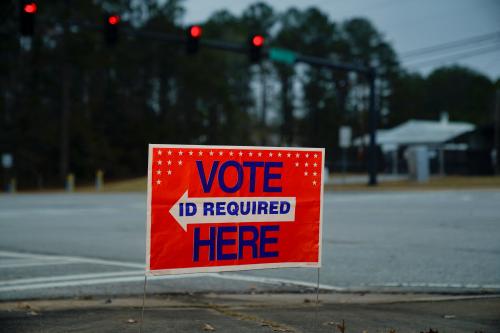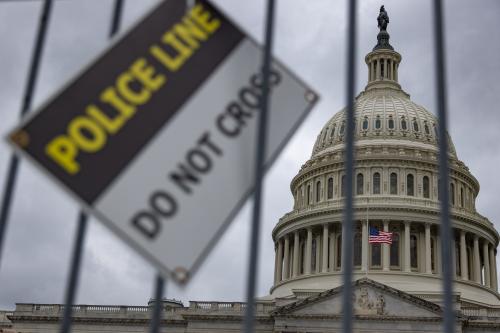In recent weeks, as often in the past, many key Democrats have contributed importantly to American national-security debates. They have been trying to increase funding for homeland security efforts, prodding President George W. Bush to remain multilateral in his approach to Iraq even as they support his basic goals and his strong leadership on the issue, and rightly criticizing the president for an uncertain North Korea policy. For the good of the party and the country, they need to keep it up.
It has not always been so. In 2000 and again 2002, the Democratic Party suffered serious setbacks in large part because it underrated the importance of national-security issues to the American electorate.
In the 2000 presidential race, Vice President Al Gore lost the election in Florida after having done his utmost to avoid discussion of national-security issues during the campaign on the grounds that American voters did not rank them highly on their list of top priorities. This despite the fact that Florida is home to several military bases and nearly 2 million military veterans (second only in veteran population to California)—and despite Gore’s impressive credentials in the national-security arena.
In 2002, Democrats lost the Senate in large measure over the perception—at least partly correct—in states such as Missouri and Georgia that they had impeded formation of a new department of homeland security in the interest of defending the political interests of a traditional union constituency. Recent polls on Iraq and the war on terrorism show that Republicans are trusted to do a better job than Democrats by a margin of 20 percent among potential voters.
Democrats’ problems with national security can perhaps be addressed by the right sort of national platform in the 2004 presidential race. But in a broader sense, the problem that has faced the party since Jimmy Carter’s presidency—a perception of weakness on military and related matters—requires an overhaul of Democratic thinking on national security. Otherwise the problem may be partly solved in one election, as Bill Clinton accomplished in 1992, only to resurface at a later date.
Put simply, many Democratic advisers and pollsters fail to recognize just how large the prodefense voting pool remains in this country today. The 9/11 attacks only go to strengthen that reality, but it was a basic fact of American politics before the terrorist strikes 18 months ago.
In the United States today there are 25 million Americans who have served in the armed forces. Another 6 million people are heavily involved in defense today, including 1.4 million active-duty troops, nearly 1 million reservists, over 600,000 full-time civilian employees of the Department of Defense, and 3 million contractors working for the Department of Defense. Then there are the immediate families of those individuals.
All in all, perhaps 50 million adult Americans have a very strong tie to the armed forces and many are highly motivated voters. Over 60 percent of veterans are over 50 years of age, with nearly 40 percent over 65. This places veterans in an age group known to demonstrate high voter turnout. Age is not the only reason for high turnout among veterans; there is also patriotism. For example, a poll taken by the veterans organization Veterans of Foreign Wars showed that 91 percent of its members faithfully trek to the polls.
For most of these people, national-security issues will always be a top-five voter priority. Even if public opinion polls seem to show, as in 2000, that the American electorate on the whole does not always rank military and security issues among its top 10 worries, a large minority of voters feel otherwise. This situation is only reaffirmed by the 9/11 tragedy. Recent polls show terrorism and a possible war in Iraq as rating just behind the economy and jobs in general importance.
Some of the 50 million adult voters with military ties may not feel particularly strongly about national-security matters. In particular, about 30 percent of the total is the Vietnam generation. Some may feel turned off by national-security issues. Many certainly harbor a great wariness about the use of American military force abroad.
But even the Vietnam War generation clearly has many voters acutely interested in maintaining a strong military and a decisive, resolute foreign policy. On balance, the “silent 50 million” voting bloc—constituting perhaps a quarter of the entire American electorate—probably feels an intensity about national security that ensures it will always want to hear credible thoughts from any national candidate on the subject.
This is related to an important point: Public-opinion polls do not generally measure voters’ intensity of feelings, only their preferences, whether strong or weak. But voters cast ballots based on the intensity of their convictions about certain issues. When asked an open-ended question in a poll conducted by the Vietnam Veterans of America Foundation, jobs and the economy topped the list of voters’ concern. However, when asked directly if foreign affairs had more of an influence in voting decisions than jobs, taxes, and the economy, a stunning 57 percent responded yes. It is clear where the voters’ intensity lies.
As 2004 approaches, Democrats need to learn this lesson—not only for their own partisan benefit but for the basic health and vitality of the two-party system in the U.S. today.


Commentary
Op-edIt’s No Longer Just the Economy, Stupid
February 19, 2003